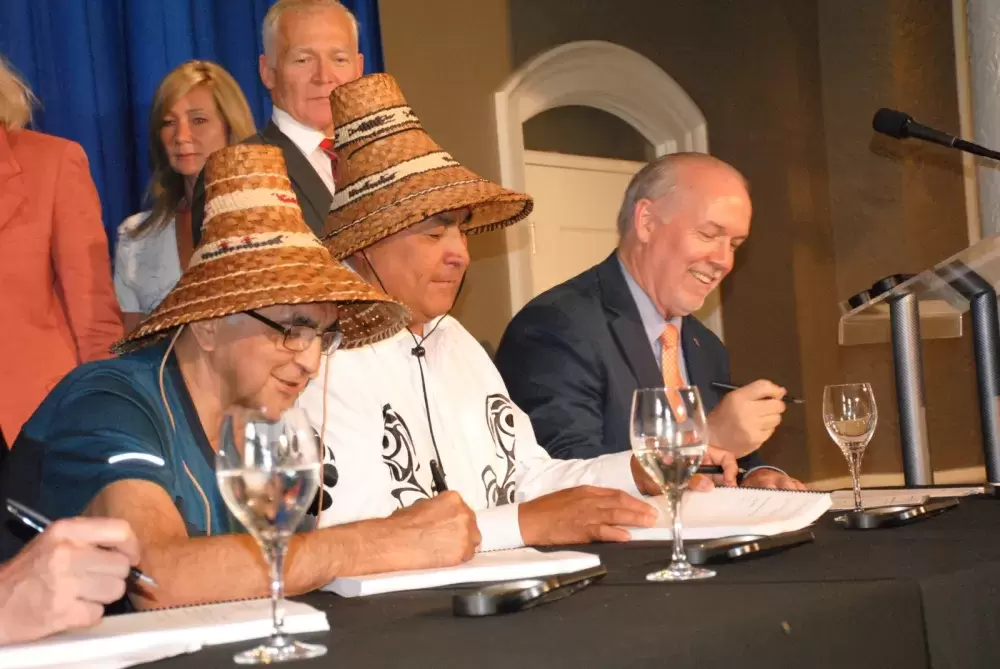Two Nuu-chah-nulth nations are in Stage Five of the six-stage treaty process as the BC Treaty Commission celebrates its 30th anniversary.
Both Pacheedaht and Ditidaht entered into the treaty process in 1996 with other Nuu-chah-nulth Nations. Over the years they left the main table and entered negotiations together with the federal and provincial governments. Today, they are each negotiating treaties on their own.
Robert Joseph, Ditidaht’s technical negotiator said, “We’re moving along pretty good now, in general terms.”
The nation is making some headway in joint decision-making models with the province and the feds.
“They’re no longer telling us it can’t be done,” he added.
Kristine Pearson, the referrals coordinator for the Pacheedaht, said the First Nation is in a similar position as they negotiate their final agreement. They are working on co-management models for non-treaty settlement lands and for their portion of Pacific Rim National Park, which runs through the territories of several Nuu-chah-nulth nations.
Ditidaht negotiators have made progress in securing lands around Nitinaht Lake for the nation, including lands previously set aside for national parks.
According to Joseph, Ditidaht has seen benefits through the incremental treaty model, allowing them access to lands, which they logged and bought fee simple around the shores of Nitinaht Lake with the proceeds.
Similarly, Pacheedaht has gained land through their ITA (Incremental Treaty Agreement). Signed in 2013, the ITA allowed for the transfer of land to Pacheedaht, with more coming at the signing of the final agreement.
According to the provincial government, modern-day treaties are necessary in order to meet legal obligations to clearly define the rights and responsibilities of both the province and First Nations. Treaties provide a cooperative way to resolve issues and help avoid future conflict in the courts, according to the government.
Treaties are also designed to address economic and social injustices by providing First Nations with the authority to manage their own affairs and become less dependent on government support, bringing certainty to land and resource rights.
There are eight constitutionally entrenched modern treaties in British Columbia, including Nisga’a and Maa-nulth First Nations. The Maa-nulth Final Agreement came into effect on April 1, 2011. It was negotiated between Canada, British Columbia and the Huu-ay-aht, Ka:'yu:'k't'h'/Che:k'tles7et'h', Toquaht, Uchucklesaht and Yuułuʔiłʔath First Nations under the BC treaty process.
Progress is being made with nine nations working on Agreements in Principal and an additional 11 nations working on Memorandums of Understanding, treaty revitalization agreements or other negotiation revitalization agreements.
According to the BCTC, there are currently 31 actively negotiating First Nations representing 62 Indian Act bands in the B.C. treaty negotiations process.
On Sept. 21 the BC Treaty Commission marked the 30th year since its inception. On Oct. 19 the BCTC released its 2022 Annual Report at the First Nations Summit Meeting in Musqueam.
Joseph estimates it could take two to three years for Ditidaht First Nation to reach a final agreement, allowing them to move on to stage six, implementation of the final treaty.
While Pearson is optimistic that Pacheedaht will reach a final agreement, she declined to provide an estimate of when that could be.
“There is always hope,” she said, noting that in this day of reconciliation, both governments have been very motivated to get it done.

